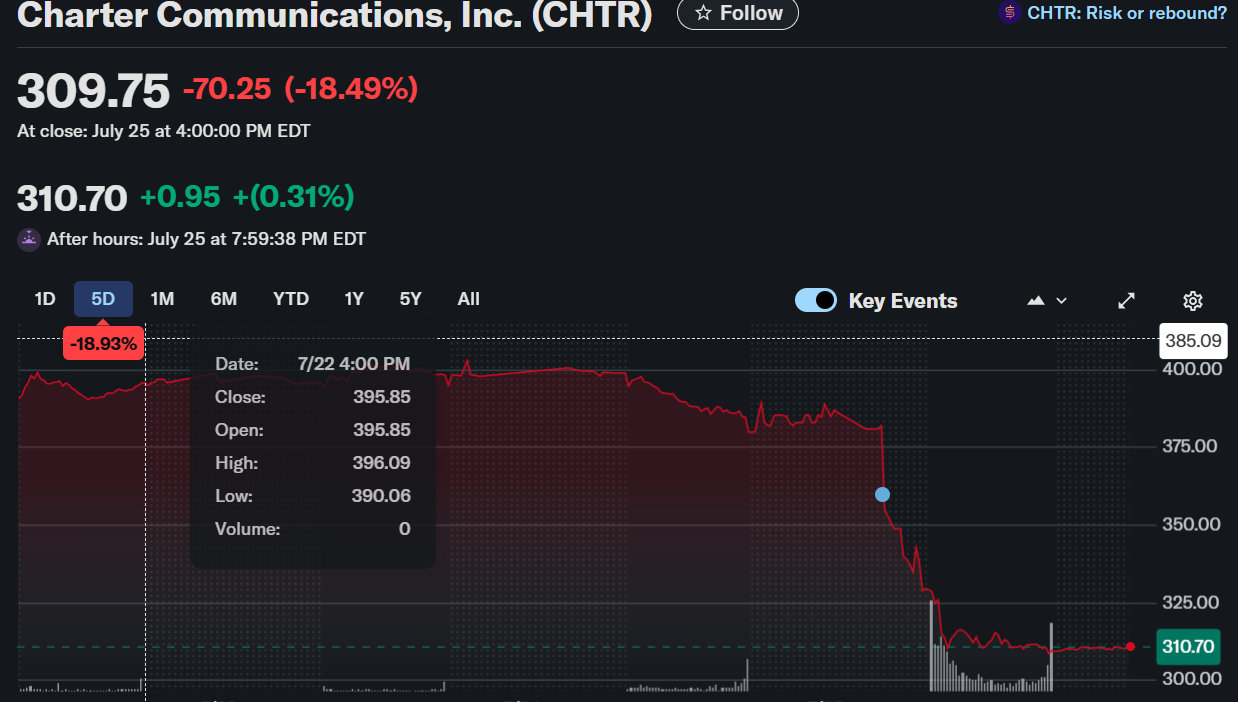TLDR
- Charter shares dropped 18.49% to $309.75 after Q2 results
- Internet subscribers fell by 117,000 in the quarter
- Revenue remained flat at $13.7 billion; net income rose 5.7%
- Mobile line additions hit 500,000, up 25% YoY
- Free cash flow dropped $250 million; $1.7B in share buybacks
Charter Communications Inc. (NASDAQ: CHTR) closed Friday at $309.75, down 18.49%, after reporting flat revenue and another drop in broadband customers.

Charter Communications, Inc. (CHTR)
The company lost 117,000 Internet subscribers in Q2, lowering its base to 29.9 million from 30.02 million in Q1. This decline, while smaller than the 149,000 lost a year earlier, signals ongoing churn in a competitive market.
Earnings Improve on Lower Costs
Despite flat top-line performance, net income attributable to shareholders increased 5.7% year-on-year to $1.3 billion. The company attributed this to lower interest expenses and higher adjusted EBITDA. Net income for the first half of 2025 rose 7.7% to $2.5 billion, supported by steady cost controls. Revenue remained unchanged at $13.7 billion in Q2 and $27 billion for the first six months.
Subscriber Trends Show Divergence
While broadband subscribers declined, mobile additions showed strength. Charter added 500,000 Spectrum Mobile lines during Q2, a 25% increase over the last year. The company’s video losses also slowed to 80,000, down from 408,000 in Q2 2024. The bundling of Hulu with traditional video packages and anticipated launches of ESPN Unlimited and FOX One were cited as product enhancements supporting customer retention.
Charter is bleeding internet subscribers — and the stock could see its worst day ever https://t.co/3WKGWS34WM
— MarketWatch (@MarketWatch) July 25, 2025
Financial and Strategic Highlights
Capital expenditures totaled just under $2.9 billion in Q2, unchanged from last year. Free cash flow declined to $1 billion, down $250 million year-on-year due to higher taxes, interest payments, and working capital changes tied to mobile handsets.
Charter repurchased 4.5 million shares for $1.7 billion at an average price of $375. Debt remains high, with $94.3 billion in principal at a weighted average cost of 5.2%.
Market Pressures and Outlook
Advertising revenue dropped 6.7%, reflecting weak demand in both national and local markets. Residential revenue also fell 0.4% due to shifts in product mix and price sensitivity. Despite the challenges, Charter remains optimistic about Spectrum Mobile’s growth trajectory, supported by its MVNO deal with T-Mobile and evolving product bundles.
Charter’s long-term performance continues to trail broader market benchmarks. As of July 25, 2025, the company posted a year-to-date return of 9.63%, slightly ahead of the S&P 500’s 8.62%. However, its 1-year return stood at just 1.74%, significantly underperforming the S&P 500’s 18.33%. Over the longer term, Charter’s 3-year and 5-year returns reached 35.33% and 44.86%, respectively, both falling short compared to the S&P 500’s 61.05% and 98.67%.
This suggests that while Charter has managed modest gains, it has consistently lagged behind the broader market, reflecting investor concerns around subscriber losses and a flat revenue outlook.Conclusion
Charter’s Q2 reflected operational resilience with profit growth and mobile expansion, but subscriber attrition, flat revenue, and reduced cash flow prompted a sharp market reaction. Investors remain concerned about sustained broadband declines and margin pressures in the near term.







